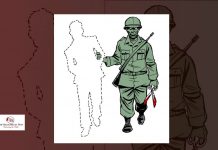Author: Saira Baloch
The world is witnessing a paradigm shift in the global political order. The era of the unipolar world, dominated by the United States and its allies, is gradually coming to an end. The emergence of China as an economic superpower, the resurgence of Russia, and the growing assertiveness of regional powers like Iran and Turkey are challenging the existing world order. The rise of these powers is accompanied by a shift in the balance of power from the West to the East and the South, leading to the emergence of a polycentric world order.
This changing global political order has significant implications for regional movements like the Baloch movement. The Baloch people are an ethnic group who reside in the Balochistan region, which spans across Iran, Pakistan, and Afghanistan. The Baloch movement is a nationalist movement that seeks greater autonomy and rights for the Baloch people.
Historically, the Baloch movement has had strong ties with Europe, particularly with countries like Germany and Switzerland. During the 1970s insurgency, Baloch political workers were active in Europe, publishing newspapers and mobilizing support for their cause. However, the changing dynamics of the global political order have forced the Baloch movement to reassess its alliances and adopt an anti-Europe mindset.
The Baloch movement is not the only regional movement affected by these changes. Across the world, regional powers are seeking to assert their influence and establish their own centers of power, challenging the dominance of the West. This is evident in the Middle East, where Arab countries are normalizing their relations with Iran, and in Central Asia, where countries like Russia and China are expanding their influence.
The rise of China as an economic superpower has had a profound impact on the global political order. China’s Belt and Road Initiative (BRI) is a massive infrastructure project that seeks to connect Asia, Europe, and Africa through a network of ports, highways, and railways. The BRI has the potential to reshape the global economy and create a new world order centered around China.
The BRI has also impacted regional movements like the Baloch movement. China has invested heavily in the China-Pakistan Economic Corridor (CPEC), a key component of the BRI that passes through Balochistan. The CPEC has been criticized by Baloch activists, who argue that it will lead to the exploitation of Balochistan’s resources and further marginalize the Baloch people.
The changing global political order has also impacted the Baloch movement’s relations with regional powers. In the past, the Baloch movement had received support from the United States, which saw the Baloch as a potential ally against Iran. However, the Trump administration’s decision to cut aid to Pakistan, which has been accused of human rights violations in Balochistan, has led to a shift in the Baloch movement’s alliances.
The Baloch movement has also sought support from India, which has its own tensions with Pakistan. However, India’s relations with China have deteriorated in recent years, and India has been forced to reassess its alliances. India’s recent decision to normalize relations with China and Russia suggests that it is no longer willing to rely solely on the West to advance its interests.
In conclusion, the changing dynamics of the global political order have significant implications for regional movements like the Baloch movement. The emergence of a polycentric world order and the growing assertiveness of regional powers are challenging the dominance of the West and forcing regional movements to reassess their alliances. The Baloch movement, like other regional movements, is seeking to assert its autonomy and establish its own center of power. The future of the Baloch movement, like the future of regional movements across the world, will depend on how it navigates these changing geopolitical realities and adapts its strategies to meet the new challenges it faces.
Disclaimer: The views and opinions expressed in this article are those of the author and do not necessarily reflect the official policy or position of The Balochistan Post or any of its editors.






























